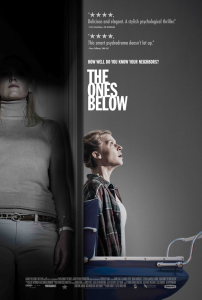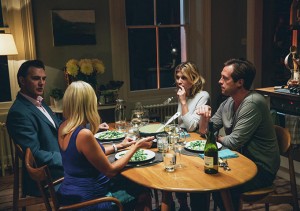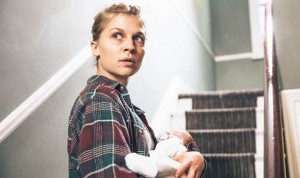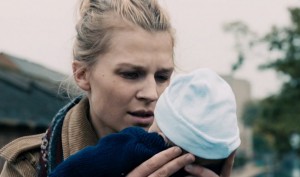
We know there’s something up with the new neighbors the second we meet them. Not just because of the overbearing score denoting it as such, but in the way they act. Theresa (Laura Birn) is a kooky and outgoing woman, but squirms in her seat and quizzically shifts her eyes whilst sneaking in sips of wine at the dinner table. Her husband, Jon (David Morrissey, giving off strong Liam Neeson vibes), is calm the one minute then a hothead the next. Even their joy over Theresa’s pregnancy sends off strange vibes, as they linger too much on their happy thoughts. When they discover their neighbors took ten years to decide they wanted to have a child, they stare them down with disdain and confusion. There’s never a moment where their presence doesn’t make you uncomfortable.
Kate (Clémence Poésy) and Justin (Stephen Campbell Moore) get the same vibes, but it’s not long before that switches to guilt. After dinner one night, Theresa trips down the stairs of their flat, losing her baby in the process. The blame is put on Kate and Justin for both the lack of lighting in their hallway leading to the stairs and for their cat for inadvertently causing the fall. This is all happens so fast that it causes a mood whiplash, the rare kind that actually works in the film’s favor. David Farr directs the film with such odd pacing that astutely compliments the odd nature of the story.

Theresa and Jon move out just as quickly as they moved in, not being able to bare the sight of the couple they blame for the loss of their unborn child. Even harder is for them to watch as Kate is to give birth to her child, one they feel she doesn’t truly want or deserve. Just as Kate and Justin move on from the tragic incident, their former neighbors return, now surprisingly warm and welcoming. Something’s not quite right.
David Farr gets a lot out of something so simple. In the grand scheme of things, not too much abnormal occurs. Theresa and Jon try and make amends, with both Kate and Justin slowly letting their guards down. The actions that spark the suspicions are rather mundane, such as the stove being left on and the tub overflowing. We know it’s the work of the scorned couple trying to stir the pot; it’s a matter of how long it takes the victims to realize it or start turning against one another. As tensions begin to rise, so do the actions, getting more twisted the longer things play out. Even then, the twisted nature of the actions is still tame in comparison to other thrillers.

What this thriller has going for it is ripe tension. One can’t shake the feeling of unease throughout the film. While we’ve seen this type of film before and can most likely pinpoint what’s going to happen, there’s still an air of mystery engulfing the proceedings. We’re never quite sure what’s going through the minds of the childless couple and that’s the truly unnerving part. We expect Jon to explode and when he doesn’t we get curious, even slightly startled. The thrills come from what can happen, not what does. Farr develops superb psychology!
So much of the psychology working can be placed into the performances. All four key performers utilize body language to elicit drama. Poésy fares the best, with her long stares and body shakes triggering the viewer’s anxiety. Farr taps into the strain a marriage receives with the addition of a child and pries upon that for drama. One even begins to question if Jon and Theresa are innocent and it’s Kate that’s simply losing her sanity, though the kibosh gets put on that rather quickly.

“The Ones Below” isn’t flawless. It takes a while for Farr to get comfortable with his characters, shuffling their motivations around. Justin starts off as the skeptical one, only to morph into the voice of reason to counteract Kate’s paranoia. A subplot involving her unsupportive mother (Deborah Findley) is meant to highlight Justin’s rationality, but is too undercooked for that to develop properly. Jon and Theresa’s mood swings are forgivable only because it fits in line with their intentions.
On paper, “The Ones Below” feels like a run of the mill Lifetime thriller. It has all the makings for one, even including some unintentionally funny moments (such as Theresa hissing at the cat). Where it rises above the average Lifetime feature is in Farr’s confident direction. The suspense never feels forced, the performances never tacky, and the twist, whilst bonkers, is earned.
Final Rating: B
